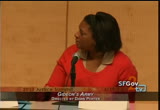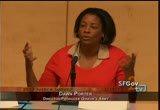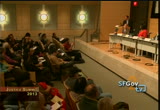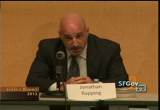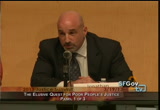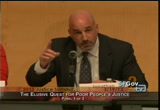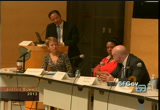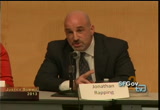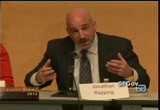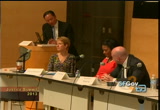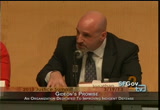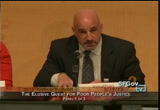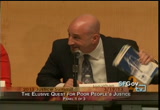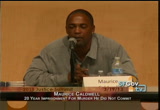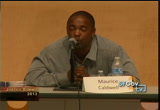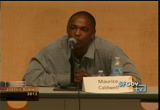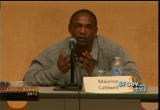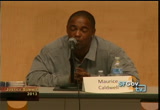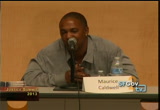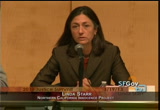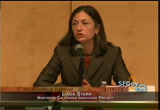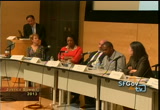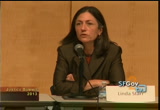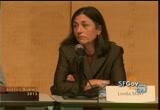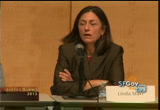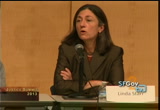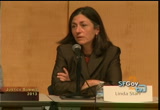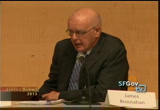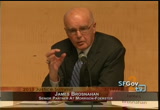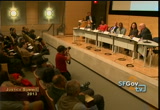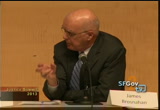tv [untitled] July 9, 2013 1:30am-2:01am PDT
1:30 am
talking about civil rights litigate or heroes which i think they are. >> what is next in the film and what do you see for film and how do people learn more about it. >> the film will be on hbo in july in the summer series which is great because they do a lot of marketing. we are selecting the open night. which is a thousand seat audience. it is the premier selection. it's at the film festival as it went to sundance and they voted it and it's a film we would like to bring home. we are doing as many film festivals as we can. we won the audience award and
1:31 am
jury award in miami and doing as many speaking and community talk back events. the film i hope will become a gathering point for people to use and say this is what's happening in our jurisdiction. this shows the experience of just a few lawyers. there are many people struggling to do a great job across the country. >> what's your website? >> we'll be taking questions. now let's move to john rapping who is one of the individuals featured in the film. john, i
1:32 am
remember when you first talked about starting a training center for public defenders, no one took you seriously. so what happened? you created it and you have been successfully training defenders. what motivated you to do that and how did it all come to be? >> first, i have been waiting 10 years. there is no doubt in my mind there is no civil rights struggle going on this country to make sure that poor people have lawyers. but it's something i really didn't understand when i started as a public defender. i started in a well resource office with manageable case loads and i was able to give clients with a gideon vision and then i moved to georgia for the statewide public defenders system in georgia and then i moved to new orleans in the wake of katrina
1:33 am
to help rebuild that office and started to see what i experience nd dc was the exception and not the rule. for example i remember walking into a courtroom in new orleans, very first time ever walked into a courtroom in new orleans and there were people everywhere. people in suits you didn't know who the defenders were, you didn't know who the prosecutors were and you knew who the clients were because they were shackled on the seats. the judge started calling names and in the next second he would call another name and you heard voices, that would be the voice speaking for the person. a lawyer never stood next to the client and then the judge calls a name and there was no voice and he says is there mr. so and so here? he says i'm here. >> he says where is your lawyer? i haven't seen my lawyers since 70 days ago. what
1:34 am
had been shocked to me for a man who had been locked for more than 70 days, nobody knew that. they had been used to a system, a level of expectation for poor people and the kind of justice they deserve. they become so used to it that they accepted it. that gave me this idea that we need to start a movement, it needs to be a movement of public defenders who get it so we started building gideon's promise by creating young defenders from across the south to join this 3 year program to get training and support and started from 15 lawyers from 2 offices from atlanta to new orleans, jay was in or class. today we have over
1:35 am
200 lawyers from over 30 offices across 13 states. we have a program for leaders, a program for trainers. a program for our graduates, all from don's film have come through the program. that's why i did it. i really believe the public defenders can walk through a room across systems and remind people of these ideals that gideon was all about that quite frankly everyone in the system has forgotten. [ applause ] >> so judge. tell us about what is some of the concrete stechs steps that we can take in terms of training lawyers? it's great that you are working with individual lawyers, but how do you create a movement? how do you reach the 15,000 public
1:36 am
defenders. you have to also republican there remember there are contract attorneys where there are no public defenders office. >> i want to share one more story with you. a couple weeks ago a friend of mine forwarded a link. one of the public defenders leader who headed up a state system was testifying before a budget committee and the committee asked him, do you have enough resources to do your job? and his response was well, i'm in a district with 5 counties and i have, so there are 5 court houses and i have 5 lawyers and one investigators. last year we closed 4,000 cases, that's 8 hundred cases per lawyer. i have resources. it reinforces this idea that when you have been in a broken system for so long, you can
1:37 am
come to accept an embarrassing low standard. so how do we train lawyers to change that? i really think that -- i sort of now, although i came up with the name the southern public defenders training center. it's not just training we do. when people think of training they think of learning cross-examination skills and of learning the law. what we do is teach lawyers to adopt values that are missing in the system. we give them strategies when they confront challenges in the system to overcome those challenges instilling values in them and we have a membership community that reinforces to try to do that and the goal is when they are raiseing the standard of interpretation. in 10 years one of them will be sitting at that table, one of them will get that question an
1:38 am
they will answer it correctly. i don't have enough resources. the movement is about teaching people to be better lawyers today but also building an army of people across the region and ultimately across the country who will work their ways into positions of power where they are leading public defenders offices and hiring people behind them to do what you do all the time, jeff, you are out there telling people that public defenders matter. [ applause ] >> believe me, it's always a struggle. i see my budget analyst telling me right here. you talk about reaching policy makers and politician and elected officials, how do we reach them? you can be the best lawyer in the world, but if you don't have an investigator and you don't have
1:39 am
the resources you are not going to be able to do a competent job. i understand that we can train individual defenders to be better defenders but how do we get those resources? >> how do we get the resources? there is not one answer to this question. i absolutely agree with karen and don that these stories move people and we have to use these stories in books and movies to get legislators who are human beings to recognize that there is a real injustice out there. i think we need to push for more funds and more resources. i think all of that is really important. the piece we bring to it is in the meantime our lawyers represent 300 people a year. the most common call i get from a lawyer, they say, i understand what my clients deserve and i can't give it to
1:40 am
them and i think i need to quit. i i can't do what you all do. i tell them about a book i read called freedom summer about the summer project 1964 when young people from all over the country and the south, bruce tells the story through the interviews of these young people and they went and talked about how they can change the world. they knocked on the doors and they said i don't want anything to do with you. they got discouraged. john louis said if it wasn't for freedom summer, barack obama wouldn't be in the whies how white house. 40 years from now our children are going to see a better
1:41 am
criminal defense public defense system because of you. so our lawyers are changing the world. public defenders are changing the world everyday and you don't realize it because you are caught up in this wrath of injustice. part of it is supporting the public defenders to advocate with stories to try to get the resources that we need and to ultimately build a movement where the voices are too loud. you can't ignore the voices saying. remember what gideon said, this is a civil rights issue and we need to shame the country into stepping up to the plate. >> if anyone wants to learn more about gideon's promise i have borrow brochure. the website is gideon's
1:42 am
promise.org. >> can you tell us about your personal story ? >> my personal story came in 1991. i was convicted of second degree murder of shooting into an occupied car and attempted murder. it all erupted from the area i was from. i was from the projects in san francisco off the -- i forgot the highway, but i was a very interesting person of character from that projects. i was no angel but no killer. several different individual officers that brought me to the interest of a murder investigation. they put me right in a loop of a murder
1:43 am
investigation with no evidence, no investigation whatsoever. it was just from a personal conflict between me and one san francisco police officer that led the whole conviction. >> and you were sentenced to life in prison? >> yes. i was sentence today 27 years to life for the crime. >> you had a lawyer represent you. do you feel that your lawyer did -- >> i didn't have a public defender. i needed a lawyer that that african guy had up there. every lawyer that i interviewed. i had a lawyer, even some of the public defenders, i went with a lawyer that wasn't going to just sit down with the truth. i wanted
1:44 am
someone who was going to get in a courtroom. i needed somebody with that authority. my family paid a lawyer to fight my case and throughout my whole case this lawyer didn't investigate, he didn't go to the crime scene, he didn't subpoena witnesses. none of that. even with the homicide inspectors knew about the crime, they knew somebody else committed the crime but due to my character and my uprising, i was the one to take the fall for it. >> once you are convicted of a crime. it's almost impossible to get it reversed. how did you do that? >> hope. you know in society you don't know what hope is until you are in a critical
1:45 am
situation and you are saying i hope this and wish that. my hope was just fail, you know everyday i was hoping and praying that i would get out. my story would be not just heard because the story was heard, somebody would believe me and not look at where i come from and my bad character and understand that i didn't commit the crime. so hope to me was like it was overwhelming and every time i got in contact with somebody that i thought could help me or even interest in my case there was hope. if i can write a letter to a person and they can listen and read my letter that was hope to me that maybe they can react and even write me back. so in prison, it was like, without hope in prison, and without, i wanted to say something. i jumped
1:46 am
around. i want to say, jeff, the public defenders office was something that really helped me because it was jeff that opened the door to my investigation and to the office in san francisco for innocent project. i was one of the persons that was able to get lawyer from that innocent project but then not having a lawyer for a time, the project and his office had to let it go because they had too many cases. so they referred my case to the santa clara innocent project with linda star and from then off that's where fate came in. i didn't have anymore hope. hope died out. now i'm here. [ applause ]
1:47 am
you know, now i'm here. i'm blessed. i'm honored to see that there is so many people that are interested in the system that it's clear as day is broke. you know can't one person in society to say the system is not broken. for everyone who could feel the same, it should be shouldn't be hard. gideon's promise. i never heard about it. now i just listen and looking at the movie, that's something i did because many times i sat in my cell and i just wrote somebody to try to hear my cry for help and i finally got it. like i say, fate brought me here. now my hope has been restored to this innocent project. you know what i'm saying? [ applause ] >> thank you. linda, you have seen story after story similar
1:48 am
to maurice's, what are common thread do you see and what can be done to reduce wrongful convictions? >> there are several causes of wrongful convictions and almost always in every case it's a constant variety of causes, that would be that case and in maurice's case as well. he had an effective attorney. he was not a public defender and has since been disbarred. it was his only criminal case. he shouldn't have taken the case to begin with. it's with the help of the public defenders office that initial help with jeff's office that we were able to get the case over turned ultimately. but as maurice said about his case, i wouldn't have needed an attorney if the
1:49 am
police and prosecutors had done their job to begin with. he's right. i don't want to lose track of that. his attorney was inadequate but he wouldn't have been in the position if everyone else had done their job in the first place. that is pervasive in our system and people working in the trenches is hard to overcome that complacency and their client issen entitled to that. that doesn't provide the information that they need to challenge the prosecution. where we know many of our experts on arson and the
1:50 am
fire wasn't arson. when you have evidence that isn't disclosed you have experts that are challenged because there are no resources and you have a system that has burden the public with too many cases and it's impossible for them not to be complacent. we have to remember to be vigilant and challenge a system that doesn't give a person representation are entitled to. >> i wanted to ask you what is it about the culture of prosecution or prosecutors that allows wrongful convictions. i know there have been stories of prosecutors who have been responsible for exonerating individuals who they believe are wrongfully convicted but that's the exception, not the rule. i know in a documentary
1:51 am
central park 5 and after 5 young men were imprisoned and later exxon rated them. what do you think has to change in terms of the actuality cult you are culture of the criminal justice system that will prevent this in the future? >> the win it all mentality has to go. i think there is this tunnel vision and that is colloquial that is for a human being to not come up with a conclusion first and look at the facts that go to support and look at that conclusion and we all suffer from it one way or another. prosecutors suffer
1:52 am
greatly. they commit a lot of resources to that prosecution. i'm not talking about the evil plays who don't care whether somebody is innocent or guilty. i think most of them think they are going after the correct person and they think that's what they have done and it's difficult for them to back out of that to take a hard look and step back and take a hard look at it. you are right, it's been really difficult for us to get any tracks to do that and let the judge decide. but to step up and say i'm not going to let a judge decide this. i'm going to own this and say we made a mistake. when we have prosecutors that do that, we have to honor that and recognize it what it did take inform are them to be able to step forward and do it. also our attorney general's have to be able to step back and say,
1:53 am
okay, court's have an approved this conviction, they haven't reversed it but i'm convinced that it's wrong. i don't know how else but to point out to them to plead with them and meet with them and those that know them, respect them and ask them and those that have an audience, tell them that that's the right course for them to take. >> innocent projects, most of them are privately funded and they rely on local fund raising. they are not funding at government entities. it's very difficult to do the work you do and i commend you for it. what kind of demand do you have for the services that you provide? >> an unmeetable demand. you are right. we are privately funded and we scrounge for
1:54 am
funds to keep working. we not only get to use students to work on our cases but we also get to teach them and get them to understand those things that john was talking about, how they need to question, don't go into court when a judge says, oh, well, yes the statute for post conviction dna says that you are entitled to counsel but i'm suspending that because there is no money to pay for an attorney. don't walk out and say a judge says we can't do it. teach them. then because we have no money, we reach out to the local bar. law firms like jim's law firm or chris's law firm help us in situations where we are trying to establish counsel and
1:55 am
reinforce. we get over a thousand cases a year. from that first request we are usually able to take it down to about half. many of them who are writing to us are not claiming to be innocent. they are probably claiming that their prison conditions are inadequate and they are probably right. they might be claiming that they haven't received their medication, they are probably right. they are probably -- they often complaining that they were overcharged and over sentence. they probably right. we refer them as much as we can to those that might be able to help them. from then we begin the triage process to see if there is any kind of assistance once we investigate and if we are
1:56 am
able to litigate it. >> thank you. next i would like to ask jim, poor people who are accused of a crime have a right to a public defender but most of the cases are in civil court, child custody, workers right, compensation for catastrophic injuries. where is the combid gideon for this? >> it's not there. when you start caring about these issues, they expand. that's okay. the question that i will address and i have been interested in it since 1962. i'm quite mature. and been working on it my own little way. it has to do with the right to counsel in civil case. i will tell you 3 stories. if i give you the statistics, if i
1:57 am
sit here and tell you 6 out of 10 middle class people who go to court do not have a lawyer or 8 out of 10 do not have a lawyer. i have diminished those people and in this culture that's one way to take care of the problem because it's almost gone when you hear it. i will tell you 3 stories. a us citizen born and raised in hawthorne california with a limited mental capacity, having lived in the united states, living with his mother and 3 other kids. got arrested on a small trespass. he entered what i can call a criminal factory known as the main jail in los angeles where they process and you can almost feel bad for them but not quite. they process thousands of people.
1:58 am
people with hispanic names are called out to be interviewed. he did not have the capacity to explain what i just told you was his background. he was on a bus. he went to immigration service. he was on a bus. he was taken to tijuana and released. no lawyer in that process. every religion that i'm familiar with teaches that things like that are not the right way to go and we do have public officials who are happy to mention their own religion and i get a kick out of it and check their voting record because on this issue and on your issue, they are part of the problem. who are they? they are your friends. they are the people you like. they like environmental things, other things. these things i tried to talk to them and so have others much more powerful than i am.
1:59 am
he was in mexico for 3 months. he had a mental breakdown. he thought he was dead. to check if he was dead he stepped out in front of a trick and the truck missed him. and his mother went day in and day out to check the bodies in tijuana and finally he wondered back and finally the lawyers at a c l u, made a case t . the government was unrepent ant. the best way to do is go to the place and look at the people and be a voice coming out as best you can and say this is what i saw and on the 5th
2:00 am
floor, some of them well-dressed people i mentioned in my statistics go into a room to get advice as to how to handle their particular matter to question their connection to their children. and there is a woman there in the line and she thinks that her former husband molested her oldest child and he now wants custody and he has a lawyer and she doesn't. now i know what lawyers do. i do pro bono. i do money bono too. i go into ceo's offices. we have arguments and we
38 Views
IN COLLECTIONS
SFGTV2: San Francisco Government Television Television Archive
Television Archive  Television Archive News Search Service
Television Archive News Search Service 
Uploaded by TV Archive on

 Live Music Archive
Live Music Archive Librivox Free Audio
Librivox Free Audio Metropolitan Museum
Metropolitan Museum Cleveland Museum of Art
Cleveland Museum of Art Internet Arcade
Internet Arcade Console Living Room
Console Living Room Books to Borrow
Books to Borrow Open Library
Open Library TV News
TV News Understanding 9/11
Understanding 9/11